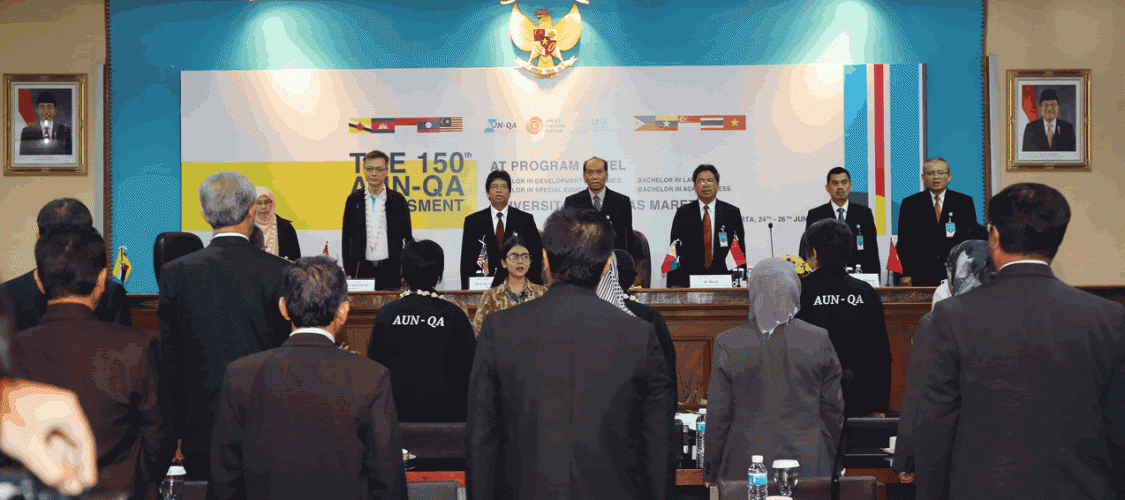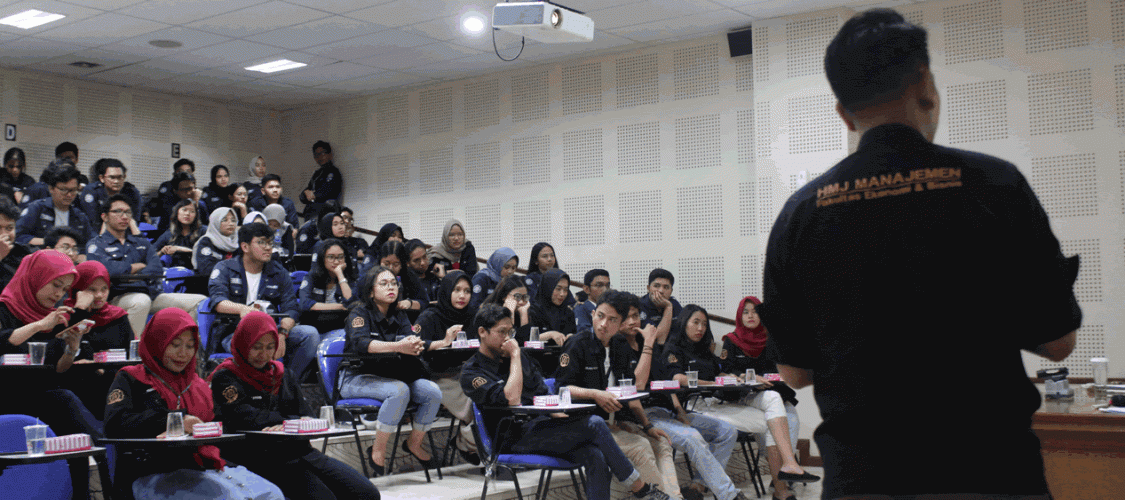
Our Undergraduate Program in Development Economics is one of the Study Program in the Faculty of Economics and Business, specializing in the economic development studies in developing countries, for the past, current, and future development. The main topics delivered will lead students to find a solution for various problems in economic development, including the factors hampering the development process in the developing countries compared to the developed countries.
Our Program has a significant role in the decision or policymaking process in a private company, governmental sector, State-Owned Enterprises, or even the banking sector. Students will receive in-depth knowledge on human resource and institutional topics, business economy, monetary and international economics, as well as development planning. The Program is designed to prepare graduates with high adaptability to the dynamic labor market both in the private and public sectors.
VISION:
Becoming a high-performing and sustainable Development Economics Study Program at the national and international levels based on the noble values of national culture
MISSION:
-
Organizing quality education and teaching at undergraduate (S1) degrees in the field of Development Economics, both scientific and applied to produce graduates who are competent and able to contribute at national and international levels.
-
Organizing quality research that can be published in national and international journals and is beneficial for scientific development and community life based on scientific ethics.
-
Organizing quality community service activities and oriented towards community empowerment efforts on the basis of the implementation and development of the Development Economy.
INTENDED LEARNING OUTCOME (ILO):
DESP has seven ILOs, namely:
- ILO1: Students are able to explain economic theories,
- ILO2: Students are able to understand the current economic condition,
- ILO3: Students are able to explain monetary and fiscal policies, development planning, business, international trade, and local economy,
- ILO4: Students are able to conduct project evaluation and business management,
- ILO5: Students are able to collect data and information, integrate data from various sources, interpret data and information, and evaluate data for accuracy and relevance,
- ILO6: Students are able to analyze quantitative and qualitative data, and
- ILO7: Students are able to develop scientific papers with appropriate economic theories, concepts, terminologies, and method
|
Semester |
No |
Course |
Type |
C/E |
SKS |
Learning Outcome |
Learning Method in line with Kampus Merdeka |
|
|
1
|
1 |
Introduction to Accounting I |
BB |
C |
3 |
LO2, |
Internal |
MKF |
|
2 |
Introduction to Business |
BB |
C |
3 |
LO2, |
Internal |
MKF |
|
|
3 |
Introduction to Macroeconomics Theory |
BE |
C |
3 |
LO1, |
Internal |
MKWP |
|
|
4 |
Introduction to |
BE |
C |
3 |
LO1, |
Internal |
MKWP |
|
|
5 |
Mathematics I |
BE |
C |
3 |
LO4, |
Internal |
MKWP |
|
|
6 |
Bahasa |
GK |
C |
2 |
LO4, |
Internal |
MKU |
|
|
7 |
English |
GK |
C |
3 |
LO4, |
Internal |
MKU |
|
|
|
|
Credit in the 1st Semester |
|
|
20 |
|
|
|
|
2
|
8 |
Introduction to |
BB |
C |
3 |
LO2, |
Internal |
MKF |
|
9 |
Management |
BB |
C |
3 |
LO2, |
Internal |
MKF |
|
|
10 |
Macroeconomics I |
BE |
C |
3 |
LO1, |
Internal |
MKWP |
|
|
11 |
Microeconomics I |
BE |
C |
3 |
LO1, |
Internal |
MKWP |
|
|
12 |
Mathematics II |
BE |
C |
3 |
LO4, |
Internal |
MKWP |
|
|
13 |
Descriptive Statistics |
DA |
C |
3 |
LO4, |
Internal |
MKWP |
|
|
14 |
Pendidikan Pancasila |
GK |
C |
2 |
LO2, |
Internal |
MKU |
|
|
|
|
Credit in the 2nd Semester |
|
|
20 |
|
|
|
|
3
|
15 |
Macroeconomics Theory II |
BE |
C |
3 |
LO1, |
Internal |
MKWP |
|
16 |
Microeconomics Theory II |
BE |
C |
3 |
LO1, |
Internal |
MKWP |
|
|
17 |
Inferential Statistics |
DA |
C |
3 |
LO4, |
Internal |
MKWP |
|
|
18 |
Islamic Economics |
AE |
C |
3 |
LO2, |
Internal |
MKWP |
|
|
19 |
Public Finance I |
AE |
C |
3 |
LO2, |
Internal |
MKWP |
|
|
20 |
Monetary Economics I |
AE |
C |
3 |
LO2, |
Internal |
MKWP |
|
|
21 |
International Economics I |
AE |
C |
3 |
LO2, |
Internal |
MKWP |
|
|
22 |
Religion Education |
GK |
C |
2 |
LO2, |
Internal |
MKU |
|
|
|
|
Credit in the 3rd Semester |
|
|
23 |
|
|
|
|
4
|
23 |
Resource and Environmental |
AE |
C |
3 |
LO2, |
Internal |
MKWP |
|
24 |
Agriculture Economics |
AE |
C |
3 |
LO2, |
Internal |
MKWP |
|
|
25 |
Development Economics I |
AE |
C |
3 |
LO2, |
Internal |
MKWP |
|
|
26 |
History of Economics |
AE |
C |
3 |
LO2, |
Internal |
MKWP |
|
|
27 |
Industrial Economics |
AE |
C |
3 |
LO2, |
Internal |
MKWP |
|
|
28 |
Central Banking |
AE |
C |
3 |
LO2, |
Internal |
MKWP |
|
|
29 |
Econometrics I |
DA |
C |
3 |
LO4, |
Internal |
MKWP |
|
|
30 |
Research Methodology |
RS |
C |
3 |
LO2, |
Internal |
MKWP |
|
|
31 |
Introduction to |
GK |
C |
2 |
LO2, |
Internal |
MKWP |
|
|
|
|
Credit in the 4th Semester |
|
|
26 |
|
|
|
|
5
|
32 |
Entrepreneurship |
MS |
C |
2 |
LO2, |
Internal |
MKWP |
|
33 |
Project Evaluation |
RS |
C |
3 |
LO4, |
Internal |
MKWP |
|
|
34 |
Statistics Laboratory |
DA |
C |
1 |
LO4, |
Internal |
MKWP |
|
|
35 |
Econometrics II |
DA |
C |
3 |
LO4, |
Internal |
MKWP |
|
|
36 |
Econometrics Laboratory |
DA |
C |
2 |
LO4, |
Internal |
MKWP |
|
|
37 |
Labor Economics |
AE |
C |
3 |
LO2, |
Internal |
MKWP |
|
|
38 |
Concentration |
|
E |
3 |
|
Internal |
|
|
|
|
|
Credit in the 5th Semester |
|
|
20 |
|
|
|
|
6 |
39 |
Civil Education |
GK |
C |
2 |
LO2, |
Internal |
MKU |
|
40 |
Business Law |
GK |
C |
3 |
LO2, |
Internal |
MKF |
|
|
41 |
Basic Natural Science |
GK |
C |
2 |
LO2, |
Internal |
MKU |
|
|
42 |
Economics of Cooperative |
AE |
C |
3 |
LO2, |
Internal |
MKWP |
|
|
43 |
Economic Analysis Tools |
DA |
C |
3 |
LO4, |
Internal |
MKWP |
|
|
44 |
Indonesian Economy |
AE |
C |
3 |
LO2, |
Internal |
MKWP |
|
|
45 |
Concentration |
|
E |
3 |
|
Internal |
MKP |
|
|
46 |
Concentration |
|
E |
3 |
|
Internal |
MKP |
|
|
|
|
Credit in the 6th Semester |
|
|
21 |
|
|
|
|
7
|
47 |
Internship |
MS |
C |
2 |
LO2, |
Internal |
MKF |
|
48 |
Community |
MS |
C |
2 |
LO2, |
Internal |
MKF |
|
|
49 |
Seminar |
RS |
E |
3 |
LO1, |
Internal |
MKWP |
|
|
50 |
Concentration |
|
E |
3 |
|
Internal |
MKP |
|
|
|
|
Credit in the 7th Semester |
|
|
10 |
|
|
|
|
8
|
51 |
Thesis |
RS |
C |
6 |
LO1, |
Internal |
MKP |
|
|
|
Credit in the 8th Semester |
|
|
6 |
|
|
|
|
|
|
Concentration Elective – Development Planning (PP) |
|
|
||||
|
5 |
1 |
Development Planning |
PP |
E |
3 |
LO2, |
|
|
|
5 |
2 |
Regional Economics |
PP |
E |
3 |
LO2, |
|
|
|
6 |
3 |
Development Planning and |
PP |
E |
3 |
LO2, |
|
|
|
6 |
4 |
Local Government |
PP |
E |
3 |
LO2, |
|
|
|
7 |
5 |
Public Policy |
PP |
E |
3 |
LO2, |
|
|
|
7 |
6 |
Development Economics II |
PP |
E |
3 |
LO2, |
|
|
|
|
|
Concentration Elective – Business Economics (EB) |
|
|
||||
|
5 |
1 |
Agribusiness |
EB |
E |
3 |
LO2, |
|
|
|
5 |
2 |
Portfolio Management and |
EB/MI |
E |
3 |
LO2, |
|
|
|
5 |
3 |
Business and Community |
EB |
E |
3 |
LO2, |
|
|
|
5 |
4 |
Bank and Financial |
EB/MI |
E |
3 |
LO2, |
|
|
|
7 |
5 |
Tourism Economics |
EB |
E |
3 |
LO2, |
|
|
|
7 |
6 |
International Economics II |
EB |
E |
3 |
LO2, |
|
|
|
6 |
7 |
Marketing Management |
EB |
E |
3 |
LO2, |
|
|
|
6 |
8 |
International Business |
EB |
E |
3 |
LO2, |
|
|
|
|
|
Concentration Elective – Resource and Institution (SD&K) |
|
|
||||
|
5 |
1 |
Demographic Economics |
SD&K |
E |
3 |
LO2, |
|
|
|
5 |
2 |
Environmental Economics |
SD&K |
E |
3 |
LO2, |
|
|
|
6 |
3 |
Institutional Economics |
SD&K |
E |
3 |
LO2, |
|
|
|
7 |
4 |
Urban Economics |
SD&K |
E |
3 |
LO2, |
|
|
|
7 |
5 |
Political Economics |
SD&K |
E |
3 |
LO2, |
|
|
|
7 |
6 |
Economics Valuation |
SD&K |
E |
3 |
LO2, |
|
|
|
6 |
7 |
Rural Economics |
SD&K |
E |
3 |
LO2, |
|
|
|
7 |
8 |
Grass-Roots Based |
SD&K |
E |
3 |
LO2, |
|
|
|
|
|
Concentration Elective – Monetary and |
|
|
||||
|
5 |
1 |
Bank and Financial |
EB/MI |
E |
3 |
LO2, |
|
|
|
5 |
2 |
Investment Management and Portfolio |
EB/MI |
E |
3 |
LO2, |
|
|
|
7 |
3 |
International Economics II |
MI |
E |
3 |
LO2, |
|
|
|
7 |
4 |
Modelling Monetary |
MI |
E |
3 |
LO2, |
|
|
|
7 |
5 |
International Financial |
MI |
E |
3 |
LO2, |
|
|
|
7 |
6 |
Monetary Policy |
MI |
E |
3 |
LO2, |
|
|
|
6 |
7 |
ASEAN Economy |
MI |
E |
3 |
LO2, |
|
|
|
GK |
General |
PP |
Development |
|
BE |
Basic Economics/ |
MI |
Monetary |
|
AE |
Advance |
SD&K |
Resource |
|
DA |
Data |
EB |
Business |
|
RS |
Research |
|
|
|
BB |
Basic |
C |
Compulsory |
|
MS |
Managerial |
E |
Elective |
LEARNING OUTCOMES
- LO1: Menguasai pemahaman yang baik tentang perkembangan teori-teori ekonomi
- LO2: Menguasai dan memiliki kepekaan terhadap fenomena ekonomi masa kini dan masa depan dan mampu mendesain solusinya
- LO3: Menguasai pemahaman yang baik tentang perkembangan kebijakan moneter dan fiskal, perencanaan pembangunan, industri, perdagangan internasional dan ekonomi lokal
- LO4: Mampu menghimpun dan mengintegrasikan informasi ekonomi dari berbagai sumber, memaknai informasi, dan akurasinya serta aspek kekiniannya
- LO5: Menguasai kemampuan dalam mengidentifikasi, menginterpretasi,
dan menganalisa data kuantitatif dan data kualitatif - LO6: Menguasai cara penyajian hasil penelitian berbasis teori ekonomi, konsep, terminologi dan metode yang tepat.
- LO7: Menguasai konsep-konsep ekonomi dalam menilai kelayakan usaha dan pengelolaan usaha
1. Excellence in education and student affairs is realized through the following policies:
- E-learning based learning (2019 – 2023)
- Preparation of research-based textbooks/textbooks (2019 and 2020)
- Curriculum revitalization based on scientific development and market needs (2016, 2017 and 2020)
- Competency development based on Study Program concentration (2016, 2020)
- Development Planning; Monetary and International; Business Economics; and Resources and Institutions.
- Sending lecturers to various national and international scientific forums (2019-2023)
2. Excellence in research is realized through policies:
- Preparation of the Study Program research roadmap in accordance with the university roadmap (2016)
- Grouping of lecturers in research groups according to competence and concentration in the field of science (2017)
- Increased publication of research results on a national and international scale (2019 – 2023)
- Organizing technical assistance for research proposals and scientific publications (2019–2023)
3. Excellence in the transfer & development of knowledge and knowledge is realized through policies:
- Presenting experts as guest lecturers (2019 – 2023) in collaboration with Universiti Kebangsaan Malaysia (UKM); Universiti Sains Malaysia (USM); University of Indonesia, Curtin University.
- Development of international research collaboration networks (2015 – 2019)
4. Excellence in knowledge management is realized through policies:
- Implementation of teaching group (2019-2023)
- Digitization of theses (2019–2023)
- E-journal-based thesis publication (2019-2023)
- Access to e-journals (2019–2023)
5. Excellence in human resources is realized through policies:
- Staff development plan (2019-2023)
- Implementation of periodic training for lecturers (2019–2023)
- Implementation of regular seminars/study program discussion forums (2019–2023)
- Assignment of lecturers to participate in various scientific activities (2015–2019)
6. Excellence in quality and service management is realized through the policy:
- Development of a study program quality management system (2019-2023)
- Implementation of the study program quality management monitoring and evaluation process (2019–2023)
7. Excellence in internationalization and public image is realized through the following policies:
- Implementation of international accreditation (2021)
- Sending lecturers and students to international scientific forums (2019–2023)
Development Economics Student Association (HMJEP) FEB UNS is established as a forum for the aspirations of DESP students in the development strategy of the development economics academic community, which has its own characteristics by basing its activities on efforts to improve academic quality and the quality of member organizations professionally.
Outlines of the Organizational Work Program Directions which are the formulation of activities to improve the quality of the organization and the academic quality of its members, are prepared as an effort to develop organizational and academic goals that lead to strategic policies with the main orientation of realizing the achievement of organizational goals.
Student Achievement
Some of the student achievements are as follows:
A. Achievements in the academic field are as follows:
- The average GPA of graduates over a 5-year period is 3.45.
- The average waiting time for graduates to get their first job is 3.3 months.
- 80.00% of graduates work in fields that are a match for their expertise.
B. The achievements of students in the championships that have been achieved both at the international and national levels are as follows:
1. International Championship
- International Chorwettbewerd 2014 (team participants)
2. National Championships
- TNI Orienting Championship 2013 (Second Place)
- Equilibrium Science Fair 2013 (3rd Place)
- Trisakti Economics & Business Fair & Competition (TEBFC) 2014 (Winner of Hope 1)
- National Student Conference, Corruption-Free Economy (EBK) VI 2015
- National Seminar on Business & Call Paper 2016 (1st Place/Best Paper)
- National Economic Fair For Our Idea (NEFORIA) 2016
- National Seminar on Business & Call for Papers 2016 (Best Paper)
- Futsal Student League 2018 (Rank 2)
- National Stock Trading Virtual Competition 2020 (1st Place)
- IMPRESEA Infographic Competition 2020 (2nd Place)
- PGPAUD Event 2020 (2nd Place)
- National Business Plan Competition Technology Euphoria 2020 (3rd Place)
- Student Science Olympiad (OSM) 2020 (2nd Place)
- Indonesian Science Competition (KSI) POSI 2021 (2nd Place)
- Indonesian Science Olympiad (OSI) 2021 (2nd Place)
- College Science Competition 2021 (3rd Place)
Graduate’s Profile
According to the feedback from stakeholders and alumni using focus group discussion and tracer study, there are seven professions for DESP graduates, namely :
- Economists;
- Analysts;
- Development Planners;
- Professionals in Finance and Banking;
- Professionals in Fiscal Field;
- Asset Valuation Professionals; and
- Entrepreneurs.
Graduate’s Job Prospect
The achievements of graduates’ learning outcomes and the DESP ILO will prepare the graduates to have competencies for working in industrial sector, research, and entrepreneurship. Career prospects available for graduates include:
- Management staff / management trainees in business and non-business organizations
- Civil Servants with class III / a with the rank of Junior Officer
- Account officer, teller, financial / risk analyst, personal banking officer, relationship manager in the banking business
- Sales / marketing executive, supervisor / assistant manager in manufacturing, service and retail businesses
- Business consultant
- Entrepreneur
Accreditation and Certification
Quality Assurance in DESP
Stakeholder involvement in quality assurance of the learning process in DESP is carried out in the process of preparing the curriculum, assessing stakeholders as users of DESP graduates through a tracer study (Quality Assurance 4 – Stakeholders Involved). The preparation of DESP curriculum is carried out through stages including receiving inputs from stakeholders to determine the profile of graduates that are in accordance with the job market in Focus Group Discussion activities.
In 2020 DESP conducted FGD with the Bank Indonesia Institute, where Bank Indonesia offered internship programs for students through sub-programs of classroom learning, research, and project-based internships. Case studies and project-based learning methods were inputs from the Bank Indonesia Institute in developing the teaching and learning process in the study program. DESP responded to this by implementing changes in learning methods towards case studies and projects. This is in line with the development of RPS conducted by LPPMP UNS by emphasizing case study and project-based learning for students.
Recent News
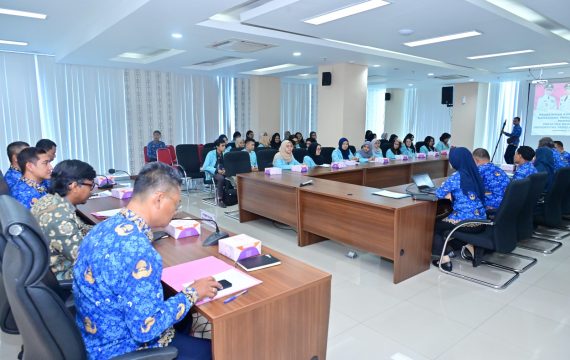
Enhancing Understanding of Public Policy, Development Economics Students Take Part in Field Study at Sukoharjo Regency Government
To provide a real-world perspective on public policy—particularly at the local
Read More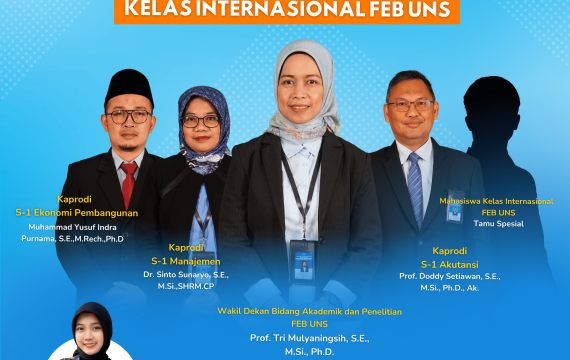
Casual Conversation on International Class at FEB UNS
UNS New Student Admission Selection Office (SPMB) in collaboration with the Faculty
Read More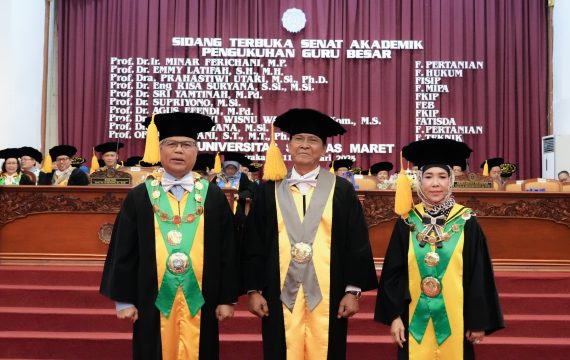
Prof. Supriyono, Professor of Conservation Economics: Stakeholder Conservation Awareness as the Foundation for Sustainable Development Planning
Prof. Dr. Supriyono, M.Si., was inaugurated on February 11, 2025, as the 25th
Read More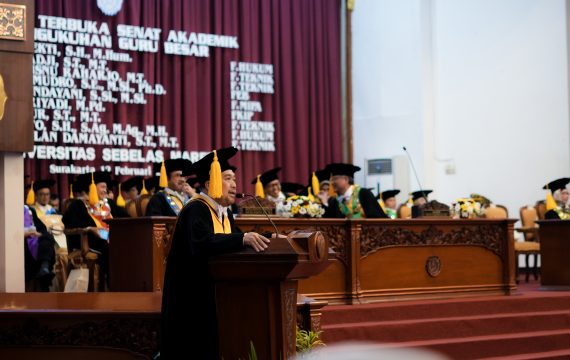
Prof. Bhimo Rizky Samudro Inaugural Address Highlights the Theme of Pseudo-Civilization and Its Impact on National Economic Sovereignty
Prof. Bhimo Rizky Samudro, S.E., M.Si., Ph.D., was formally inaugurated as Professor
Read More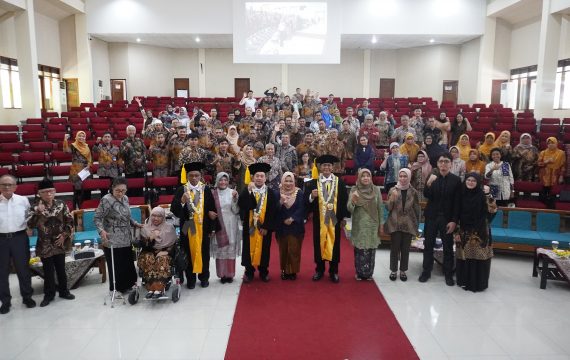
FEB UNS Faculty Members Welcome Three Newly Appointed Professors
The faculty members at the Faculty of Economics and Business (FEB), Universitas
Read More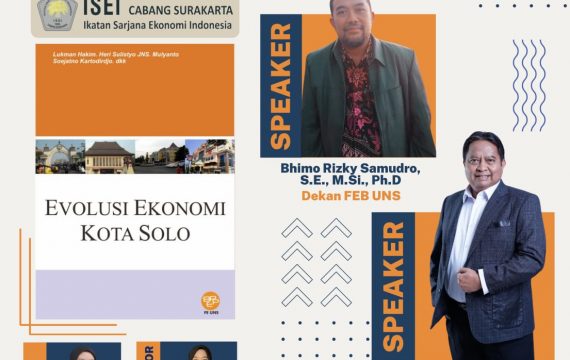
Book Talk: the Evolution of Solo’s Economy Features Two FEB UNS Faculty Members
Two faculty members from the Faculty of Economics and Business (FEB), Universitas
Read MoreContact
Email : s1ep@unit.uns.ac.id


